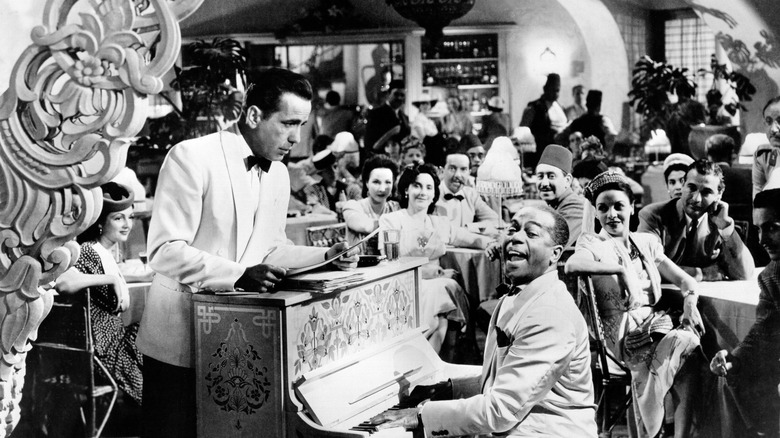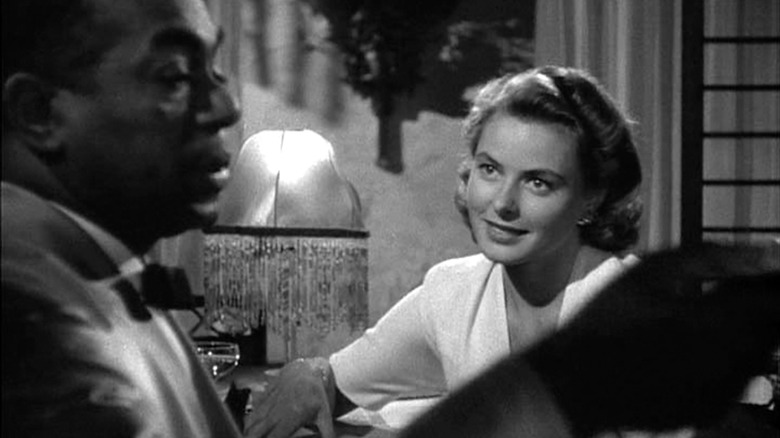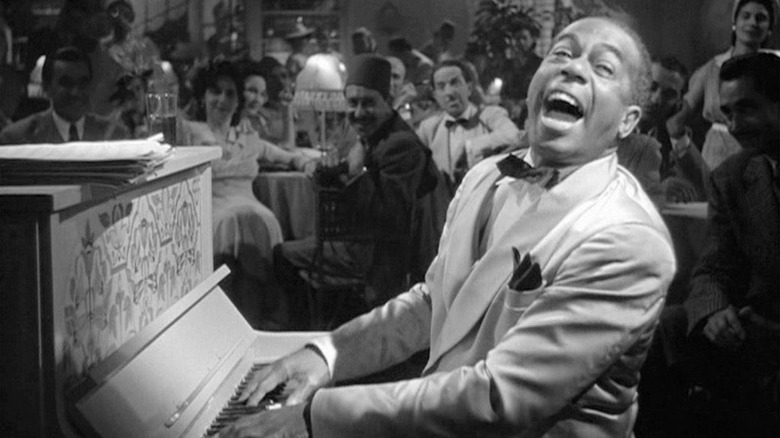Why Casablanca's Composer Disliked One Of The Film's Most Memorable Moments
It's a scene that's one of the most instantly recognizable in cinematic history: Ilsa Lund (Ingrid Bergman) walks into the Café Américain in Casablanca, Morocco. Spotting the house pianist, Sam (Dooley Wilson), she implores her old friend to "play it once," referring to a song that Sam knows holds a great deal of significance for her as well as his boss, Rick (Humphrey Bogart), who has forbidden him from playing the tune. Sam obliges Ilsa, however, playing and singing "As Time Goes By," managing to get through part of the song before Rick storms over and angrily stops him. Rick is stunned when he spots Ilsa, however, and their reunion is brief before Rick's chief of police pal Captain Renault (Claude Rains) and Victor Laszlo (Paul Henreid) — Ilsa's husband — interrupt the tension-filled moment.
The scene is just one of a number of brilliant moments in Michael Curtiz's 1942 film (including another scene based around the song!), but it's arguably the scene that best establishes the movie's ensemble of characters, their histories and interpersonal relationships, and the wistful, bittersweetly nostalgic, tragic romantic tone of the entire movie. The song "As Time Goes By" perfectly encapsulates these emotions, so much so that it would be nearly impossible to believe that it was almost cut from the film.
As it turns out, such disbelief would be well founded: despite a myth concocted and perpetuated by the film's composer, Max Steiner, "As Time Goes By" was never in danger of being cut or replaced, especially as the tune was a favorite of producer Hal Wallis. The song's inclusion helped ensure the film's legacy and, despite his protests, became the backbone of Steiner's score. Yet Steiner kept the myth of the song being on the chopping block going for decades, fooling experts and historians alike with his tale.
'You know what I want to hear': the song stays in the picture
If "As Time Goes By" seems like such a perfect fit for "Casablanca" that it feels like the two were always together, that's no coincidence. The song was originally written in 1931 by Herman Hupfeld for the Broadway musical "Everybody's Welcome," and it made an impression on playwright Murray Burnett, who, along with Joan Alison, wrote the play "Everybody Comes to Rick's," the basis for "Casablanca." Though the play would remain unproduced until 1991, screenwriters Julius Epstein, Philip Epstein and Howard Koch sought to remain faithful in their adaptation. According to "Casablanca" expert Frank Miller, Burnett loved the song so much he used it "as the love theme for Rick and the leading lady" and "nobody at Warner's questioned the use of that song, since the studio owned the rights anyway."
When Curtiz shot the picture, he had playback of the song to use on set, with the number "arranged and recorded before the film was shot." Actor Dooley Wilson, who did not actually play the piano but mimicked playing while a real pianist played "a dummy piano" off camera, lip-synched to his own vocal track. Clearly, it was always the plan that the song and the scene would be used as shot in the final edit.
According to Steven C. Smith's 2020 biography "Music by Max Steiner: The Epic Life of Hollywood's Most Influential Composer," Steiner was hired mere weeks before the end of the film's principal photography, and had not been consulted about music during the shoot. When Steiner learned that the film would include the song, he at first told the filmmakers that "it was so musically uninteresting that he couldn't work it into the score." Miller speculates that Steiner's real motivation for saying so may have been his desire to "write a new song for the film and possibly make a hit," the composer jealous that someone else's tune would make up such a large element of the film's soundtrack. Steiner was also in desperate need of royalties for a composition of his own, as Smith's book points out, and would not receive royalties for Hupfeld's song.
Producer Hal Wallis never had any intention of obliging Steiner, but the composer nonetheless fabricated a story that would help soothe his wounded ego at being made to use it. According to Smith's biography, Steiner told a reporter in 1943 that using a new song to replace "As Time Goes By" would require shooting new footage with Bergman and possibly Wilson in order to smoothly make the change, and that plus the fact that Bergman had already cut her hair into a new style for her next movie role made Wallis decide to not change the film. In truth, Wallis' love of the song, studio head Jack Warner's penchant for refusing to do reshoots, the exorbitant cost of film stock and the need to pay off another producer to have Bergman loaned back to the production meant that the song was never going to be replaced even if anyone besides Steiner had wanted to. Whether the composer liked it or not, "As Time Goes By" would be a part of "Casablanca" and film music history for all time.
'You played it for her, you can play it for me': a musical legacy
Despite Steiner's hesitancy at using "As Time Goes By," he dutifully retained the song's importance within the story of "Casablanca," making the tune the basis of his entire score for the film. The song became one of the two major musical themes of the movie, joining the French national anthem "La Marseillaise" as the pillar of Steiner's score. Thanks to the combination of the song and Steiner's score, "Casablanca" became a film whose music was an inseparable part of its identity, with "As Time Goes By" inexorably tied to images of Bogart and Bergman.
The song and its appearances in the movie became a pop cultural reference point, with countless parodies and callbacks made throughout the following decades in various films and television shows. It even spawned a Mandela effect of a quotation: the line "play it again, Sam" is never uttered by anyone in "Casablanca," yet became such a famous mis-quote that it ended up as the title for a 1972 Herbert Ross/Woody Allen comedy that payed tribute to Curtiz's film. Additionally, "As Time Goes By" itself was used as the title and the theme tune for an early-'90s British sitcom starring Judi Dench.
While the song is still generally known as the tune from "Casablanca," Warner Bros. has ensured that it remain familiar to audiences as the signature music for their entertainment studio. Beginning in the late '90s, the company used an orchestrated version of "As Time Goes By" as their logo fanfare, a tradition that continues to this day. 80 years after Ilsa and Rick asked Sam to play their song, "As Time Goes By" continues to play again and again.


